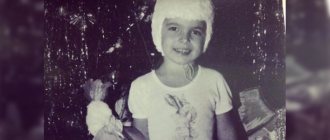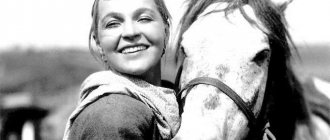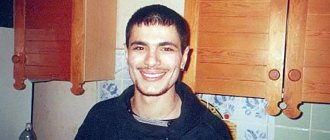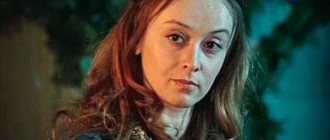Wikipedia has articles about other people with the surname Kalandadze.
| Vakhtang | |
| Full name | Vakhtang Vakhtangovich Kalandadze |
| Date of Birth | April 23, 1988(1988-04-23) (age 32) |
| Place of Birth | Tbilisi |
| A country | Georgia Georgia→Russia Russia |
| Genres | Beatbox, dub |
| Nicknames | Vakhtang |
| [vahtang.tv/.tv] | |
Vakhtang Vakhtangovich Kalandze
(Georgian ვახტანგ კალანდაძე; born April 23, 1988, Tbilisi) known under the pseudonym
Vakhtang
is a Russian beatboxer, musician, vocalist.
During his performances, he uses the capabilities of his voice to create rhythms, baselines and vocal instruments, and additionally uses a sampler and an effect processor. Actively promotes beatboxing in Russia.
Biography
Vakhtang was born in Tbilisi in 1988. At the age of three he began singing in the Georgian folk choir. At the age of 9, Vakhtang moved to live in Russia, where his drummer father introduced him to beatbox[1]. Since then, he has constantly practiced and improved his skills, while simultaneously studying vocal class at the Gnessin School.[2]
The list of the most famous events in which he took part as a special guest includes Battlefield, Camel Freemotion, Bananamama, Top 30 2003-2007, Freestylesession, Snickers Urbania and many other major events. In 2009, he took part in the World Beatbox Championship, where he took second place.[3] He is an eight-time beatbox champion in Russia.[4] In 2009 - 2010, he served in the ranks of the Russian army, in a military unit located in the Khabarovsk Territory. In July 2012, in Luzhniki, Vakhtang organized the Russian Beatbox Championship, which brought together more than 30 participants from all over Russia and a record number of spectators.
The fall of 2012 began with the creation of the Beatbox Federation, of which Vakhtang is president[5][6].
On June 7, 2013, Vakhtang became the winner of the 2013 Muz-TV Prize in the category “Best Duet” (Valery Meladze and Vakhtang - Light of the Setting Sun)[7].
To date, Vakhtang has performed in almost all of the most prestigious clubs in Moscow, his activities were covered by many authoritative sources - the O2 channel [8], TVC channel [9] Extreme magazine [10], Boards, AfishaK: Wikipedia: Articles without sources (type: not specified) [ source not specified 2579 days
] and etc.
Origins
Tbilisi occupies a special place in the biography of Vakhtang Kikabidze. He was born here on June 18, 1938, and spent his childhood here. All life is connected with this city. His parents lived in Tbilisi. From here, Father Konstantin Kikabidze went to the front, missing in action in the battles near Kerch.
His mother Manana Konstantinovna Bagrationi on his father’s side was from the princely family of Bagrationi-Davitishvili. His maternal grandmother came from the ancient princely family of Amirejibi from Kartli. Manana Konstantinovna worked as a singer at the opera house.
Notes
- Margarita Platova, Alexey Bakulev
. [ria.ru/video/20091120/194768542.html Secrets of beatbox, or What the “one-man orchestra” plays on], RIA Novosti (November 20, 2009). Retrieved November 19, 2014. - [beatboxme.ru/main/zvyozdy/68-vaxtang-kalandadze-biografiya.html Vakhtang Kalandadze - Biography] beatboxme.ru
- [www.hip-hop.ru/forum/chempionat-mira-po-bitboksu-2009-a-233508/ World Beatbox Championship 2009] Hip-Hop.Ru
- [o2tv-ru.livejournal.com/97598.html March 3 – “Beatbox Theater”: VAKHTANG – Milk Moscow] O2TV
- [7days.ru/stars/bio/vakhtang-kalandadze.htm Biography of Vakhtang Kalandadze]. Seven days. Retrieved November 19, 2014.
- [rusradio.quantumart.ru/air/broadcast/guests/6390705/?mode=rus&pim=1&page=11 Vakhtang: beatbox will be equated to a sport], Russian Radio (November 1, 2012). Retrieved November 19, 2014.
- [muz-tv.ru/news/3916/ Valery Meladze and Vakhtang - “The Light of the Setting Sun” - Best Duet!], MUZ-TV (June 7, 2013). Retrieved November 19, 2014.
- [www.youtube.com/watch?v=1q4037D42l8 Vakhtang and Maria Bulavina “Conversation on the Couch” O2TV] YouTube
- [www.youtube.com/watch?v=gdNT26mVwdk Vakhtang Kalandadze in the Mood program] YouTube
- [www.snowboarding.ru/content/view/616/54/ Snowboarding.ru — Extreme magazine announcement #11(29)]
- [volna.afisha.ru/sounds/12-glavnyh-hitov-etogo-leta-ot-nyushi-do-maykla-dzheksona/ 12 main hits of this summer from Nyusha to Michael Jackson]. Poster (June 10, 2014). Retrieved November 19, 2014.
School years
As Kikabidze himself recalled, he was a “difficult kid.” He did very poorly at school and was retained for the second year three times. His mother was very worried about him, but she could not do anything about it, since she worked all day long, and the boy was left to his own devices. According to the artist himself, he was raised by the street.
The only thing that attracted him was drawing. He drew on everything he could get his hands on: books, wrapping paper. He was also surrounded by music, and he often visited the backstage of the opera theater. But all this interested him little; only in high school did music gradually begin to enter the young man’s life.
In the evenings, the yard boys got together and played the guitar and sang songs to attract girls. One day a friend invited him to a rehearsal of a pop group at one of the institutes. Here he was asked to sing for an absent musician, and he saw a microphone for the first time. An important event occurred in the biography of Vakhtang Kikabidze - Buba “fell ill” with music. The future artist stopped hanging around on the street - now he ran around rehearsals.
Excerpt characterizing Kalandadze, Vakhtang Vakhtangovich
The change that took place in Pierre was noticed in their own way by his servants, Terenty and Vaska. They found that he had slept a lot. Terenty often, having undressed the master, with boots and dress in his hand, wishing him good night, hesitated to leave, waiting to see if the master would enter into conversation. And for the most part Pierre stopped Terenty, noticing that he wanted to talk. - Well, tell me... how did you get food for yourself? - he asked. And Terenty began a story about the Moscow ruin, about the late count, and stood for a long time with his dress, telling, and sometimes listening to, Pierre’s stories, and, with a pleasant consciousness of the master’s closeness to him and friendliness towards him, he went into the hallway. The doctor who treated Pierre and visited him every day, despite the fact that, according to the duties of doctors, he considered it his duty to look like a man whose every minute is precious for suffering humanity, sat for hours with Pierre, telling his favorite stories and observations on the morals of patients in general and especially ladies. “Yes, it’s nice to talk to such a person, not like here in the provinces,” he said. Several captured French officers lived in Orel, and the doctor brought one of them, a young Italian officer. This officer began to visit Pierre, and the princess laughed at the tender feelings that the Italian expressed towards Pierre. The Italian, apparently, was happy only when he could come to Pierre and talk and tell him about his past, about his home life, about his love and pour out his indignation at the French, and especially at Napoleon. “If all Russians are even a little like you,” he said to Pierre, “c’est un sacrilege que de faire la guerre a un peuple comme le votre.” [It is blasphemy to fight with a people like you.] You, who have suffered so much from the French, you don’t even have any malice against them. And Pierre now deserved the Italian’s passionate love only because he evoked in him the best sides of his soul and admired them. During the last period of Pierre's stay in Oryol, his old freemason acquaintance, Count Villarsky, came to see him, the same one who introduced him to the lodge in 1807. Villarsky was married to a rich Russian woman who had large estates in the Oryol province, and occupied a temporary position in the city in the food department. Having learned that Bezukhov was in Orel, Villarsky, although he had never been briefly acquainted with him, came to him with those statements of friendship and intimacy that people usually express to each other when meeting in the desert. Villarsky was bored in Orel and was happy to meet a person of the same circle as himself and with the same, as he believed, interests. But, to his surprise, Villarsky soon noticed that Pierre was very far behind real life and had fallen, as he himself defined Pierre, into apathy and selfishness. “Vous vous encroutez, mon cher,” he told him. Despite this, Villarsky was now more pleasant with Pierre than before, and he visited him every day. For Pierre, looking at Villarsky and listening to him now, it was strange and incredible to think that he himself had very recently been the same. Villarsky was married, a family man, busy with the affairs of his wife’s estate, his service, and his family. He believed that all these activities were a hindrance in life and that they were all despicable because they were aimed at the personal good of him and his family. Military, administrative, political, and Masonic considerations constantly absorbed his attention. And Pierre, without trying to change his view, without condemning him, with his now constantly quiet, joyful mockery, admired this strange phenomenon, so familiar to him. In his relations with Villarsky, with the princess, with the doctor, with all the people with whom he now met, Pierre had a new trait that earned him the favor of all people: this recognition of the ability of each person to think, feel and look at things in his own way; recognition of the impossibility of words to dissuade a person. This legitimate characteristic of every person, which previously worried and irritated Pierre, now formed the basis of the participation and interest that he took in people. The difference, sometimes the complete contradiction of people's views with their lives and with each other, pleased Pierre and aroused in him a mocking and gentle smile.
Personal life of Vakhtang
Despite his sociable, open character, Vakhtang is reluctant to let strangers into his personal life. But not long ago, he deviated from his rules and published a joint photo on social networks with Georgian model Tia Iverielli, in the caption of which he admitted that he had finally met the love of his life.
Vakhtang Kalandadze and his girlfriend
Afterword
On the Wikipedia page with the biography of Vakhtang Kikabidze, there is information that the artist participated in a concert in Kyiv dedicated to the memory of the fighters of the heavenly hundred who died on the Maidan.
Vakhtang Kikabidze has always been a popular artist, but recently everything has changed. Loyal fans leave, young people do not always understand his work. Different times, different morals. There are also people who make a name for themselves at the expense of famous personalities. Not long ago, Georgy Dzhakhai, who calls himself a “famous blogger,” started a rumor about the singer’s death, which turned out to be just a fake to attract visitors to the site.
Adulthood
Kikabidze was growing up, and he needed to somehow arrange his life. There was only one way to pursue music professionally – the Philharmonic. But after listening to him at the artistic council, they didn’t take him there: he didn’t like the hoarseness in his voice.
The director of the Philharmonic, who was present at the audition, assembled a group for tour. He invited Vakhtang to go with him under a different name. Arriving home, Buba told his mother about everything. She invited him to perform under her name. He went on his first tour to Rostov as Vakhtang Bagrationi.
Reviews of his performance in the local press were negative. But after returning to Tbilisi, the Philharmonic staff found Vakhtang and invited him to work. He has been registered here since 1959.
Movie
In 1966, when Vakhtang came to Orera, he was offered to act in films. Director Sanishvili invited him to his film “Meeting in the Mountains.” A huge success was meeting Georgy Danelia, who in 1969 began filming “Don’t Cry!”
Danelia could not find an artist for the role of Benjamin Glonti. According to the script, he was a complete red-haired man, that is, the absolute opposite of Kikabidze. Therefore, the aspiring artist was not suitable for the director.
But, apparently, the director was somehow attracted to this thin and dark-haired guy, who, along with E. Leonov, F. Mkrtchyan, A. Vertinskaya, S. Chiaureli, S. Filippov, made this film unforgettable. For his performance of the role of Glonti, Kikabidze received the prize for best role at the festival in Cartagena (Spain). Kikabidze and Danelia were friends all their lives after the film.
The most favorite film of most of Kikabidze’s admirers is the sad comedy “Mimino”, the decoration of which was the unique duet of wonderful artists F. Mkrtchyan and V. Kikabidze. But Vakhtang didn’t think so. He said that “Don’t worry!” is a masterpiece, and Mimino is simply a popular film.
The artist also starred in the films “TASS is authorized to declare”, “Melodies of the Verian Quarter”, “I, Investigator” and others. They will forever remain in the creative biography and personal life of Vakhtang Kikabidze.
The illness made him a screenwriter. When Kikabidze was in the hospital after the removal of a cyst in the brain, he began to record on a dictaphone the scripts on which the films “Be Healthy, Darling!” and “Men and Everyone Else” were made. He also became their director.
Participation in ensembles
An important point appeared in Kikabidze’s biography that influenced his popularity. This is participation first in the little-known ensemble “Dielo”, and then in the famous “Orera”, where he was responsible for vocals and drums. In Soviet times, this ensemble represented Georgia not only in the union republics, but also abroad.
VIA "Orera" was created in 1958 under the leadership of R. Bardzimashvili. His repertoire included songs by Soviet and foreign composers. The famous Nani Bregvadze sang in it. In 1966, when Kikabidze joined the ensemble, it was already the most famous group in Georgia.
In 1980, “Orera” presented G. Movsesyan’s song “Farewell to Love” to the words of M. Tanich. Soloist - Kikabidze. This song instantly makes Vakhtang famous throughout the Union.
This is followed by his most famous and beloved songs by the audience: “Heartless,” “Youth Remain,” “Two Loneliness,” “My Years,” “Native Land.” Another star has lit up on the musical Olympus - Vakhtang Kikabidze. In 1986, he left Orer to head the Rero ensemble.











